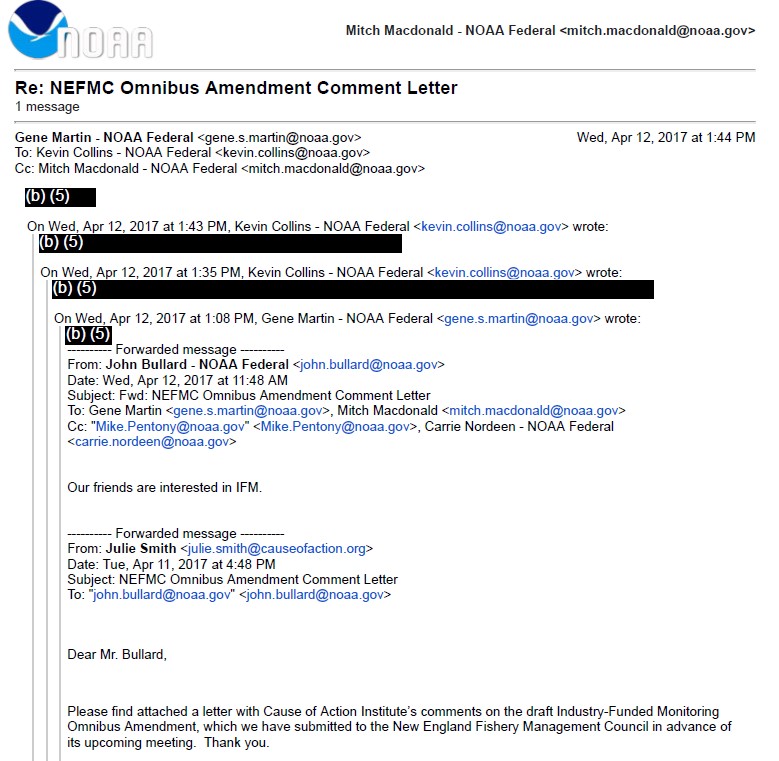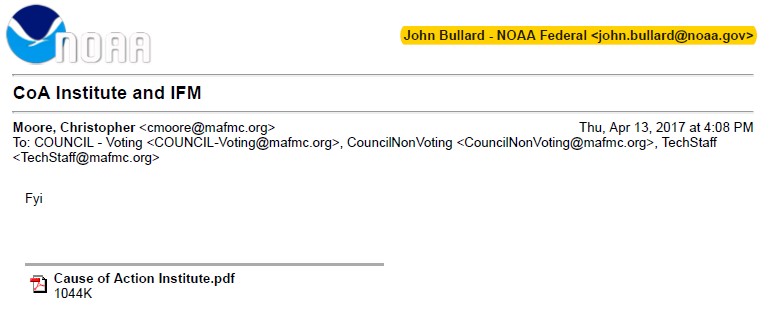Cause of Action Institute (“CoA Institute”) filed a Freedom of Information Act (“FOIA”) appeal with the Department of Homeland Security (“DHS”) yesterday, challenging the adequacy of the agency’s search for records concerning the use of private web-based email accounts by former DHS officials, as well as efforts to recover federal records from those officials’ accounts, as required by the Federal Records Act (“FRA”). Although DHS disclosed two records in response to our request—namely, a letter from the National Archives and Records Administration (“NARA”), which expressed concern over the possible alienation of federal records, and DHS’s response to NARA—DHS’s repeated representations in federal court demonstrate the existence of countless other responsive records.
High-Ranking DHS Officials Received “Waivers” to Use Private Web-based Email Accounts
In July 2015, Bloomberg reported that then-Secretary Jeh Johnson and at least twenty-eight other senior officials at DHS were granted special permission to used private web-based email accounts—such as Google and Yahoo—to conduct official business. These “waivers” were exceptions to an agency-wide ban on the use of private email that was imposed in April 2014. Agency insiders admitted that the practice of issuing such waivers was a “national security risk.” As reported by Politico, DHS ended its use of waivers, but the agency still faced numerous FOIA requests—and a lawsuit brought by Judicial Watch—from those seeking access to the work-related records created or received on the private web-based email accounts.
CoA Institute’s Initial Investigation into the DHS Webmail Waivers
On September 11, 2015, CoA Institute submitted a FOIA request to DHS for all agency records maintained on Secretary Johnson’s—or any other official’s—private web-based email account. We also sought records concerning the DHS webmail waiver regime, including policies on how waivers were granted or guidance on record retention that may have been provided to waiver recipients. In response to the request, DHS provided a substantial number of records concerning the actual processing of waivers, but it failed to produce any official correspondence from the private accounts. Although we appealed that determination, DHS upheld the adequacy of its search, even though it had openly admitted in court to having control over actual responsive records. A federal district court judge even issued a preservation order to ensure that former officials would continue to cooperate with recovery efforts under the Trump Administration.
Exploring DHS’s Compliance with the Federal Records Act
Armed with the knowledge that DHS was working to recover potential federal records from Secretary Johnson’s private web-based email account, as well as the accounts of three other former officials, CoA Institute filed two additional FOIA requests on June 1, 2017. We asked both DHS and NARA to disclose records concerning NARA approval for the practice of issuing webmail waivers, as well as records reflecting the agencies’ compliance with their FRA obligations. For example, we wanted to know whether DHS had involved the Attorney General in recovery efforts, or whether anything had been done to recover records from the other twenty-five webmail recipients that were not the subject of Judicial Watch’s ongoing FOIA litigation.
DHS could only locate two responsive records. The first was a February 22, 2017 letter from NARA, which was prompted by the Judicial Watch lawsuit and raised concerns about the possible alienation of federal records. NARA asked DHS to prepare a report on its recover efforts, along with a description of the “safeguards” that had been implemented to prevent the future alienation of records from private web-based email accounts. The second responsive record was DHS’s Mary 19, 2017 response to NARA, in which the agency described its ongoing communications with Secretary Johnson and others to facilitate the return of potential federal records. DHS claimed it was unable to locate any other responsive material.
This is an absurd determination. DHS has repeatedly described its ongoing efforts to comply with the FRA and to ensure that work-related emails from the private web-based email accounts are returned to the agency, at least with respect to the four officials identified by Judicial Watch. Whither the records of such communications? CoA Institute’s request to DHS was intentionally broad and sought to capture, among other things, “any correspondence from a webmail recipient indicating that he or she no longer ha[s] possession of DHS records in a personal email account, or that he or she ha[s] forwarded them to a DHS-hosted email account, and any records evidencing agency efforts to confirm the truth of such representations.”
As for our request to NARA, that agency has failed to provide any sort of interim response, let alone a final determination, despite the fact it had granted CoA Institute’s FOIA request expedited processing.
The Lack of Transparency in Agency Compliance with the Federal Records Act is Troubling
The Obama Administration established a pattern of high-ranking officials using personal email accounts to conduct agency affairs, thereby potentially ignoring federal laws that require the preservation of records for future disclosure to Congress and the American public. The lack of transparency with respect to the use of private email is concerning enough; the lack of transparency over efforts to remedy abusive and unauthorized use of personal email, and to return records to agency custody, is even more worrisome. Government-oversight organizations such as CoA Institute have increasingly been forced to seek judicial relief to ensure agency compliance with the FRA, and this tendency is only likely to increase given the pace of technological development.
DHS seems to be working extra hard to keep secret whether it has fully met its FRA obligations. It was certainly embarrassing for the agency when its practice of issuing waivers that allowed agency leadership to use private web-based email accounts came to light. It will be even more embarrassing if evidence surfaces to show that DHS is still dragging its feet to recover those records, as required by law.
Ryan Mulvey is Counsel at Cause of Action Institute



